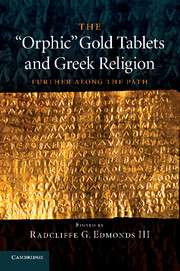Book contents
- Frontmatter
- Contents
- List of contributors
- Acknowledgements
- Note on abberivations
- PART I THE TABLET TEXTS
- PART II TEXTS AND CONTEXTS
- PART III SEMIOTIC AND NARRATIVE ANALYSES
- 8 Funerary gold lamellae and Orphic papyrus commentaries
- 9 Initiation – death – underworld
- 10 Sacred scripture or oracles for the dead?
- 11 Dialogues of immortality from the Iliad to the gold leaves
- 12 Poetry and performance in the Orphic gold leaves
- 13 Rushing into milk
- Compiled Bibliography
- Index
- Index locorum
11 - Dialogues of immortality from the Iliad to the gold leaves
Published online by Cambridge University Press: 04 February 2011
- Frontmatter
- Contents
- List of contributors
- Acknowledgements
- Note on abberivations
- PART I THE TABLET TEXTS
- PART II TEXTS AND CONTEXTS
- PART III SEMIOTIC AND NARRATIVE ANALYSES
- 8 Funerary gold lamellae and Orphic papyrus commentaries
- 9 Initiation – death – underworld
- 10 Sacred scripture or oracles for the dead?
- 11 Dialogues of immortality from the Iliad to the gold leaves
- 12 Poetry and performance in the Orphic gold leaves
- 13 Rushing into milk
- Compiled Bibliography
- Index
- Index locorum
Summary
NEW LIGHT FROM OLD TEXTS
“You have turned into a god, from the man you were”: The deification of man explicitly formulated in some gold leaves introduces such a radical novelty into the Greek religious panorama that these plates have naturally piqued the interest of scholarship for the last century and a half. It may thus seem adventurous to risk any new thoughts on them without submitting some new evidence which might fill the still enormous holes surrounding their interpretation. Yet it might prove useful to look at the scenes depicted in the already published leaves, which are dialogic in a great part, from the point of view of some texts which, perhaps precisely because of their celebrity as portraits of the traditional conceptions of life and death, have not yet been linked with them: I am referring to the dialogues of the heroes of the Homeric poems, in which notions very relevant for the understanding of the leaves, such as kleos, genos or xenia have their canonical expression. Admittedly, these dialogues are far from the gold leaves in their handling of these concepts, as in many other respects. But they offer some structural and formal parallels with the dialogues of the soul and the guardians and deities of the Underworld which suggest that the leaves are following the same poetic patterns that inspired the Homeric dialogues.
- Type
- Chapter
- Information
- The 'Orphic' Gold Tablets and Greek ReligionFurther along the Path, pp. 271 - 290Publisher: Cambridge University PressPrint publication year: 2011
- 1
- Cited by



